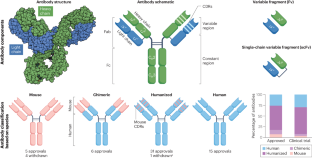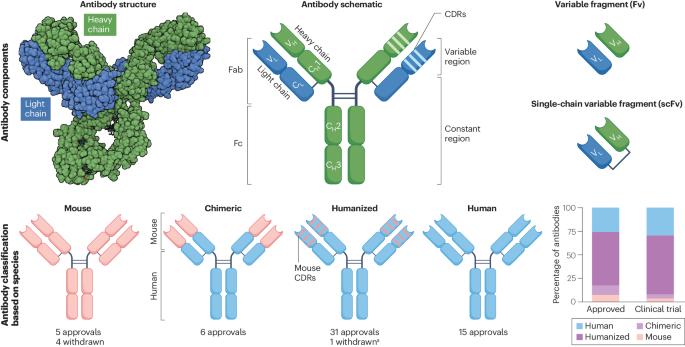用抗体治疗癌症
IF 72.5
1区 医学
Q1 ONCOLOGY
引用次数: 0
摘要
癌症治疗面临的最大挑战是在根除癌细胞的同时,尽量减少对正常细胞的损害。为应对这一挑战,人们开发了靶向疗法,与传统的癌症疗法相比,其治疗指数大大提高。抗体是靶向治疗药物家族中的重要成员,因为它们对靶抗原具有极高的特异性。治疗性抗体利用一系列机制直接或间接杀死癌细胞。早期开发的抗体可直接拮抗癌细胞上的靶点。随后,连接体技术的进步使抗体药物结合体(ADC)得以生产,从而引导细胞毒性有效载荷进入癌细胞。随着我们对 T 细胞生物学认识的提高,免疫检查点抑制抗体应运而生,通过激活 T 细胞间接杀死癌细胞。最近,我们又合成了双特异性抗体,以重新引导患者的 T 细胞杀死癌细胞。在这篇综述中,我们总结了治疗性抗体用于靶向癌细胞的不同方法。我们将讨论它们的作用机制、靶向特异性的结构基础、临床应用以及为提高疗效和降低毒性而正在进行的研究。本文章由计算机程序翻译,如有差异,请以英文原文为准。


Cancer therapy with antibodies
The greatest challenge in cancer therapy is to eradicate cancer cells with minimal damage to normal cells. Targeted therapy has been developed to meet that challenge, showing a substantially increased therapeutic index compared with conventional cancer therapies. Antibodies are important members of the family of targeted therapeutic agents because of their extraordinarily high specificity to the target antigens. Therapeutic antibodies use a range of mechanisms that directly or indirectly kill the cancer cells. Early antibodies were developed to directly antagonize targets on cancer cells. This was followed by advancements in linker technologies that allowed the production of antibody–drug conjugates (ADCs) that guide cytotoxic payloads to the cancer cells. Improvement in our understanding of the biology of T cells led to the production of immune checkpoint-inhibiting antibodies that indirectly kill the cancer cells through activation of the T cells. Even more recently, bispecific antibodies were synthetically designed to redirect the T cells of a patient to kill the cancer cells. In this Review, we summarize the different approaches used by therapeutic antibodies to target cancer cells. We discuss their mechanisms of action, the structural basis for target specificity, clinical applications and the ongoing research to improve efficacy and reduce toxicity. In this Review, Paul et al. provide an overview of therapeutic antibodies as an important modality in cancer therapy today. They summarize the different approaches used by antibodies to target cancer cells including those of immune checkpoint inhibitors, bispecific antibodies and antibody–drug conjugates, as well as describing current strategies aimed at improving their efficacy and reducing toxicities.
求助全文
通过发布文献求助,成功后即可免费获取论文全文。
去求助
来源期刊

Nature Reviews Cancer
医学-肿瘤学
CiteScore
111.90
自引率
0.40%
发文量
97
审稿时长
6-12 weeks
期刊介绍:
Nature Reviews Cancer, a part of the Nature Reviews portfolio of journals, aims to be the premier source of reviews and commentaries for the scientific communities it serves. The correct abbreviation for abstracting and indexing purposes is Nat. Rev. Cancer. The international standard serial numbers (ISSN) for Nature Reviews Cancer are 1474-175X (print) and 1474-1768 (online). Unlike other journals, Nature Reviews Cancer does not have an external editorial board. Instead, all editorial decisions are made by a team of full-time professional editors who are PhD-level scientists. The journal publishes Research Highlights, Comments, Reviews, and Perspectives relevant to cancer researchers, ensuring that the articles reach the widest possible audience due to their broad scope.
 求助内容:
求助内容: 应助结果提醒方式:
应助结果提醒方式:


